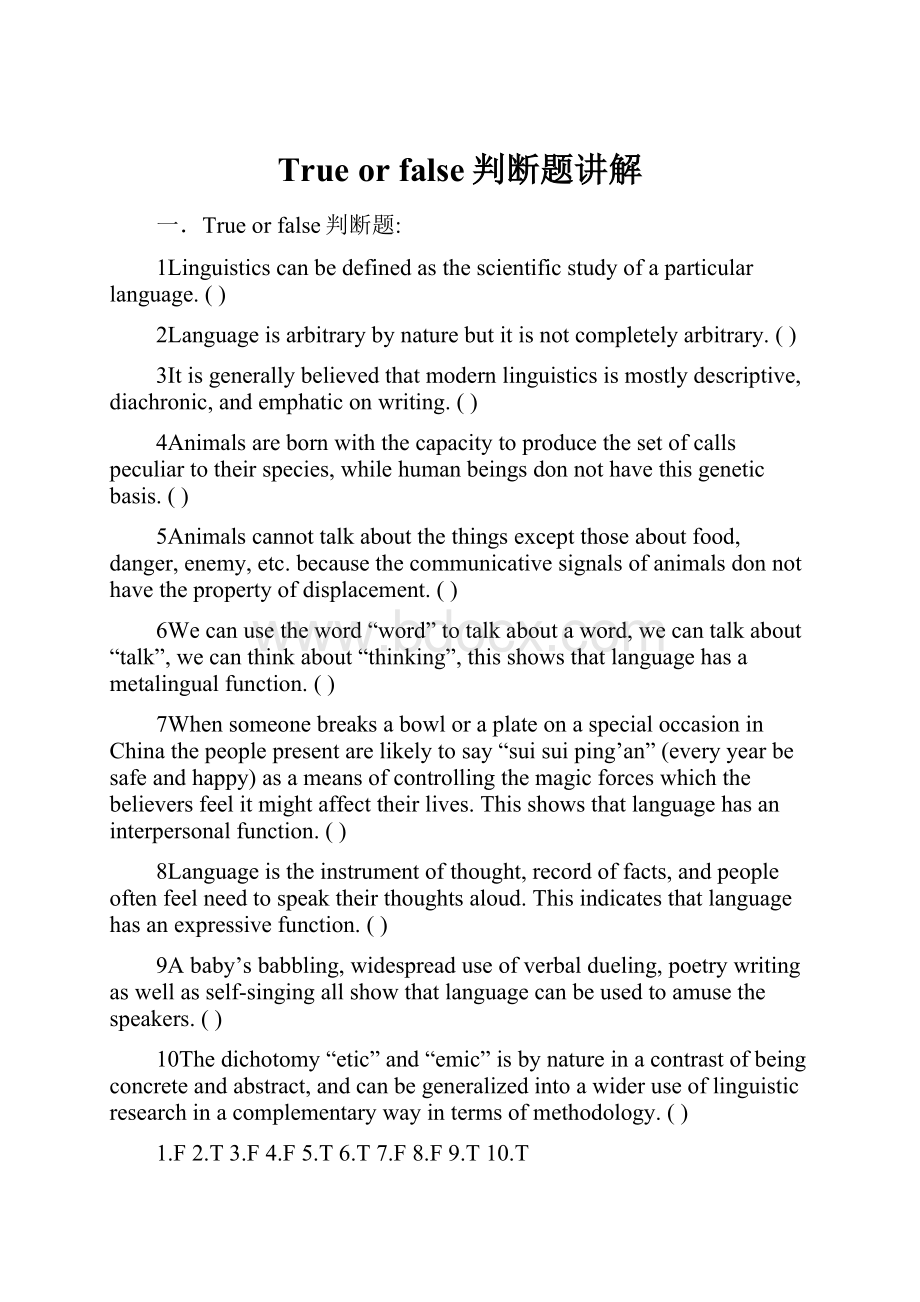True or false判断题讲解.docx
《True or false判断题讲解.docx》由会员分享,可在线阅读,更多相关《True or false判断题讲解.docx(28页珍藏版)》请在冰豆网上搜索。

Trueorfalse判断题讲解
一.Trueorfalse判断题:
1Linguisticscanbedefinedasthescientificstudyofaparticularlanguage.()
2Languageisarbitrarybynaturebutitisnotcompletelyarbitrary.()
3Itisgenerallybelievedthatmodernlinguisticsismostlydescriptive,diachronic,andemphaticonwriting.()
4Animalsarebornwiththecapacitytoproducethesetofcallspeculiartotheirspecies,whilehumanbeingsdonnothavethisgeneticbasis.()
5Animalscannottalkaboutthethingsexceptthoseaboutfood,danger,enemy,etc.becausethecommunicativesignalsofanimalsdonnothavethepropertyofdisplacement.()
6Wecanusetheword“word”totalkaboutaword,wecantalkabout“talk”,wecanthinkabout“thinking”,thisshowsthatlanguagehasametalingualfunction.()
7WhensomeonebreaksabowloraplateonaspecialoccasioninChinathepeoplepresentarelikelytosay“suisuiping’an”(everyyearbesafeandhappy)asameansofcontrollingthemagicforceswhichthebelieversfeelitmightaffecttheirlives.Thisshowsthatlanguagehasaninterpersonalfunction.()
8Languageistheinstrumentofthought,recordoffacts,andpeopleoftenfeelneedtospeaktheirthoughtsaloud.Thisindicatesthatlanguagehasanexpressivefunction.()
9Ababy’sbabbling,widespreaduseofverbaldueling,poetrywritingaswellasself-singingallshowthatlanguagecanbeusedtoamusethespeakers.()
10Thedichotomy“etic”and“emic”isbynatureinacontrastofbeingconcreteandabstract,andcanbegeneralizedintoawideruseoflinguisticresearchinacomplementarywayintermsofmethodology.()
1.F2.T3.F4.F5.T6.T7.F8.F9.T10.T
1.Phoneticsstudiesthephonicmediumofaparticularlanguage.()
2.Phonologyaimstodiscoverhowspeechsoundsofallhumanlanguagesformpatternsandhowthesesoundsareusedtoconveymeaninginlinguisticcommunication.()
3.InEnglish,pillandbillformaminimalpair,andsodolifeandknife,pinandping.()
4.TheEnglishliquidsare[w]and[j],whiletheEnglishglidesare[l]and[r].()
5.TheEnglishvowel[u:
]canbedescribeascentral,close,rounded,andlong,and[u]central,close,rounded,andshort.()
6.Thephoneme/t/and/d/canoccurinthesamepositionandtheydistinguishmeaning,thereforetheyaresaidtobeincomplementarydistribution.()
7.ThedistinctivefeaturesinEnglishcanapplytotheotherlanguages,too.Forinstance,voicingdistinguishesmeaninginbothEnglishandChinese.()
8.InEnglish,nasalizationofasoundisnotaphonologicalfeature,forinstance,[kAn]and[kAn],thatistosay,itcannottellonewordfromanother.()
9.InChinese,theassimilationrulealsoworksasinthewords“奔”and“宾”.()
10.InastandardizedEnglishsyllable,theonset,thenucleusandthecoda,allthethreepartsarecompulsory.()
1.F2.F3.T4.F5.F6.F7.F8.T9.T10.F
1.Amorphememustconveyalexicalmeaning.()
2.Allwordscanbesaidtocontainarootmorpheme.()
3.Freemorphemescanbefurtherclassifiedintoinflectionalandderivationalmorphemes.()
4.Morphologicalrulesconsistofword-formationrulesandadjustmentrules.()
5.Allwordshavemorphsbutnotnecessarilyallomorphs.()
6.Theword“modernizations”ismadeupofthreemorphemes.()
7.Derivationalmorphemesneverchangetheclassofthewordstowhichtheyareattached.()
8.Inflectionsmanifestvariousgrammaticalrelationsandlexicalrelations,suchasnumber,tense,aspect,personandcase,etc.
9.Themorphologicalrulescanbegeneralizedinspiteofsomeexceptions.()
10.Itishardtobelievethatthereisaninterfacebetweenphonologyandmorphology.()
1.F2.T3.F4.T5.T6.F7.F8.F9.T10.F
1.Thepartofasentencewhichcomprisesaninfiniteverboraninfiniteverbphraseisgrammaticallycalledaclause.()
2.Grammaticalsentencesareformedbyfollowingasetofunlimitedsyntacticrules.()
3.Thesyntacticrulesofalanguagearefiniteinnumber,yetthereisnolimittothenumberofsentenceswhichcanbeproduced.()
4.Constituentswhichcanbesubstitutedforoneanotherwithlossofgrammaticalitybelongtothesamesyntacticcategory.()
5.Languageisbothlinearlyandhierarchicallystructuredaccordingtothestructuralistlanguageview.()
6.Phrasestructurerulesprovideexplanationsonhowsyntacticcategoriesareformedandsentencesgenerated.()
7.Wh-movementisalwaysobligatoryinlanguagewhenitisintendedtochangefromanaffirmativetoaninterrogative.()
8.X-bartheoryisatypicalinstanceofprincipleintermsofChomsky’sUG.
9.UGisasystemoflinguisticknowledgeandahumanspecies-specificgiftwhichexistsinthemindofanormalhumanbeing.()
10.InformationtheoryalsoplaysaroleintheSystemic-FunctionalGrammar()
1.F2.F3.T4.F5.T6.T7.F8.T9.T10.T
1.Intheclassicsemantictriangle,thesymbolisdirectlyrelatedtothereferent.()
2.Stylisticsynonymsdifferinstylebecausetheycomefromdifferentregions.()
3.Homographsarewordswhicharepronouncedalike.()
4.Thesuperordinatetermismoreinclusiveinmeaningthanitshyponyms.()
5.Inapairofcomplementaryantonyms,thereexistsomeintermediateformsbetweenthetwoextremes.()
6.Antonymscontrasteachotheronlyonasingledimension,suchas“hot”vs.“cold”.()
7.Allthegrammaticallywell-formedsentencesarenotnecessarilysemanticallywell-formed.()
8.Oneadvantageofcomponentialanalysisisthatbyspecifyingthesemanticfeaturesofwords,itwillbepossibletoshowhowthesewordsarerelatedinmeaning.()
9.Apredicateissomethingsaidaboutanargument.()
10.Thepursuitofbothpropositionlogicandpredicatelogicistruthvalue.()
1.F2.F3.F4.T5.F6.F7.T8.T9.T10.T
二。
填空
1.Languageisasystemof__________symbolsusedforhumancommunication.
2.Linguisticsisgenerallydefinedasthe_____studyof_____.
3.Ifalinguisticstudydescribesandanalyzesthelanguagepeopleactuallyuse,itissaidtobe_____;ifitaimstolaydownrulesfor“correct”behavior,itissaidtobe_____.
4.Inmodernlinguistics,_____studyseemstoenjoypriorityover_____study.Thereasonisthatsuccessfulstudiesofvariousstatesofalanguagewouldbethefoundationsofahistoricalstudy.
5.Languereferstothe_____linguisticsystemsharedbyallthemembersofaspeechcommunity;andparolereferstothe_____oflangueinactualuse.
6.Chomskydefinescompetenceastheidealuser’s_____oftherulesofhislanguage,andperformance,theactual_____ofthisknowledgeinlinguisticcommunication.
7.“Arosebyanyothernamewouldsmellassweet”.ThisfamousquotationfromShakespeareillustratesthatlanguagehasthedesignfeatureof_____.
8.Thepropertyof_____oflanguageprovidesaspeakerwithanopportunitytotalkaboutawiderangeofthings,freefrombarrierscausedbyseparationintimeandplace.
9.Languageisasystem,whichconsistsoftwosetsofstructures,oneof_____,andtheotherof_____.Thisdoublearticulationoflanguageenablesitsuserstotalkaboutanythingwithintheirknowledge.
10.AnEnglishspeakerandaChinesespeakerarebothabletouselanguage,buttheyarenotmutuallyintelligible,whichshowsthatlanguageisculturally_____.
1.arbitrary,vocal2.scientific,language3.descriptive,prescriptive
4.synchronic,diachronic5.abstract,realization6.knowledge,realization
7.arbitrariness8.displacement9.sounds,words10.transmitted
1.Thestudyofsoundsisdividedintothreemainbranches:
_________________and________phonetics,eachdealingwithonepartoftheprocessofspeechproductionandperception.
2.Thearticulatoryapparatusofahumanbeingareembeddedinthreeimportantcavities.Thesethreecavitiesare_______________and__________.cavity
3.Thedifferencebetweenaconsonantandavowelliesinwhetherthereisair_______intheproductionofthem.
4.Vibrationofthevocalcordsresultsinaqualityofspeechsoundscalled______,whichisafeatureofallvowelsandsomeconsonants.Whenthevocalcordsdocausevibration,thesoundsproducedare_______;otherwisetheyarenamed_______sounds
5.Twowaystotranscribespeechsoundsareavailable,broadtranscriptionandnarrowtranscription.Themajordifferencebetweenthemiswithorwithout_______.
6.Whentheobstructionispartialandtheairisforcedthroughanarrowpassageinthemouthsoastocausedefinitelocalfrictionatthepoint,thespeechsoundthusproducedisa________.
7.Thebasicunitofphonologyisaphoneme.Itisanabstractcollectionof_____________.
8.Whenphonemiccontrastismentionedwerealizethatthetwosoundsbelongto_____phoneme(s),whencomplementarydistributionisdiscussed,theallophonescomefrom______phoneme(s);andfinallywhenfreevariationistalkedabout,weunderstandthatthesoundsarederivedfrom______phoneme(s).
9.InEnglish,complementarydistributionofallophonesisrequiredtomeettwoconditions,oneconditionisthattheyneveroccurinthe_____________;theotheristhattheyshouldshare_____________.
10.InEnglish,thestudyofphonologyhassofarmainlyfoundthreephonologicalrules.Theyare_____________and______rule.
1.articulatory,auditory,acoustic2.pharyngeal,oral,nasal3.obstruction
4.voicing,voiced,voiceless5.diacritics6.fricative7.distinctive,features8.two,one,one
9.sameposition,phonetic,similarity10.sequential,assimilation,deletion
1.Morphologyisabranchofgrammarwhichstudiesthe___________ofwordsandthe____bywhichwordsareformed.
2.Morphologycanbesubdividedintotwobranches:
______morphologyand_______or______morphology.
3.Thephonologicalandorthographicalrealizationsofamorphemearetermed______.
4.[-t]、[-d]、